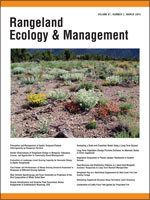Advancing our ability to use invasive plants for producing commodities is central to the agricultural industry. Our objective was to evaluate Russian knapweed (Acroptilon repens [L.] DC.) as a winter feed supplement for ruminant livestock. In Experiment 1, we utilized three ruminally cannulated steers in a completely randomized design to compare the ruminal degradation characteristics of alfalfa and Russian knapweed. In the second experiment, Russian knapweed and alfalfa were compared as protein supplements using 48 midgestation, beef cows (530 ± 5 kg) offered ad libitum hard fescue (Festuca brevipila Tracey) straw in an 84-d study. Treatments included an unsupplemented control and alfalfa or Russian knapweed provided on an iso-nitrogenous basis. In Experiment 1, the rate and effective degradability of neutral detergent fiber was greater for alfalfa compared with Russian knapweed (P ≤ 0.02). Ruminal lag time for NDF (period before measurable disappearance began) was greater for knapweed (P = 0.03). Soluble nitrogen, rate of N degradation, rumen degradable N, and effective degradability of N were all greater for alfalfa compared with Russian knapweed (P < 0.01). In Experiment 2, supplementation increased (P < 0.01) cow weight gain and BCS compared to the unsupplemented control with no difference between alfalfa and Russian knapweed (P = 0.47). There was no difference (P = 0.60) in the quantity of straw offered between the unsupplemented cows and supplemented groups, but alfalfa fed cows were offered approximately 11% more (P = 0.03) than Russian knapweed-fed cows. Total DM offered to cows was greater (P < 0.01) for supplemented compared with unsupplemented cows with no difference noted between alfalfa and Russian knapweed (P = 0.79). Russian knapweed is comparable to alfalfa as a protein supplement for beef cows consuming low-quality forage. Using Russian knapweed as a nutritional supplement can help solve two major production problems; managing an invasive weed, and providing a feedstuff that reduces an impediment in livestock production systems.
How to translate text using browser tools
1 March 2014
Knapweed Hay as a Nutritional Supplement for Beef Cows Fed Low-Quality Forage
David W. Bohnert,
Roger L. Sheley,
Stephanie J. Falck,
Arthur A. Nyman
ACCESS THE FULL ARTICLE

Rangeland Ecology and Management
Vol. 67 • No. 2
March 2014
Vol. 67 • No. 2
March 2014
digestible protein
invasive weeds
livestock feed
Russian knapweed




